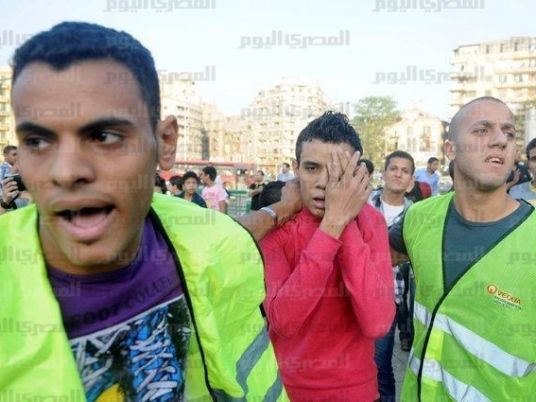
While the vast majority of Egyptian youths tend to spend the days of the holy Eid al-Fitr feast with family and friends, a group of young volunteers prefered to take to the streets to prevent anything that could disturb the joyful ambiance.
In action since late 2012, activists at Shoft Taharrosh (I Saw Harassment) spent the three-day feast, in addition to other public holidays, touring the streets of the densely-populated capital to rescue any potential victims of sexual harassment.
Volunteers divided themselves into smaller groups so as to better cover different areas in Cairo, donning uniforms bearing the campaign’s logo. They walked the streets at previously-scheduled times and communicated with each other using devices similar to walkie-talkies. They were anxious to give out brochures and put up stickers explaining the nature of their activities.
The way the campaign works is, once an incident of harassment is detected, members rush to the scene where the victim is relieved and assailants, if unresponsive to verbal advice, are handed over to security.
Rania Gaber, a volunteer at Shoft Taharrosh, told Al-Masry Al-Youm about some of the cases she encountered Saturday and Sunday, the last two days of Eid.
“There were two girls walking along the Qasr al-Nil Bridge before they were surrounded by a group of young men. The pair then ran away frightened,” she said.
“One of the cases that deeply touched me was that of two Syrian girls who were talking near the old National Democratic Party building. They were surrounded by a group of young men drumming tabors. We helped the girls find a taxi,” said Rania.
But the activist feels disgruntled with the passivity of security forces with regards to violations.
“Their interference is not sufficient, and sometimes they take a hands-off stance in the presence of volunteers like ourselves.”
Sameh Rashawy, another member of the group, put the number of verbal and physical harassment cases detected on the first day of the feast at 79, raising the number to 105 on the second day.
When asked about the public's reaction to their work on the street, activists said their efforts are hailed by people encouraging them to continue their activities beyond the feast.
Edited translation from Al-Masry Al-Youm


